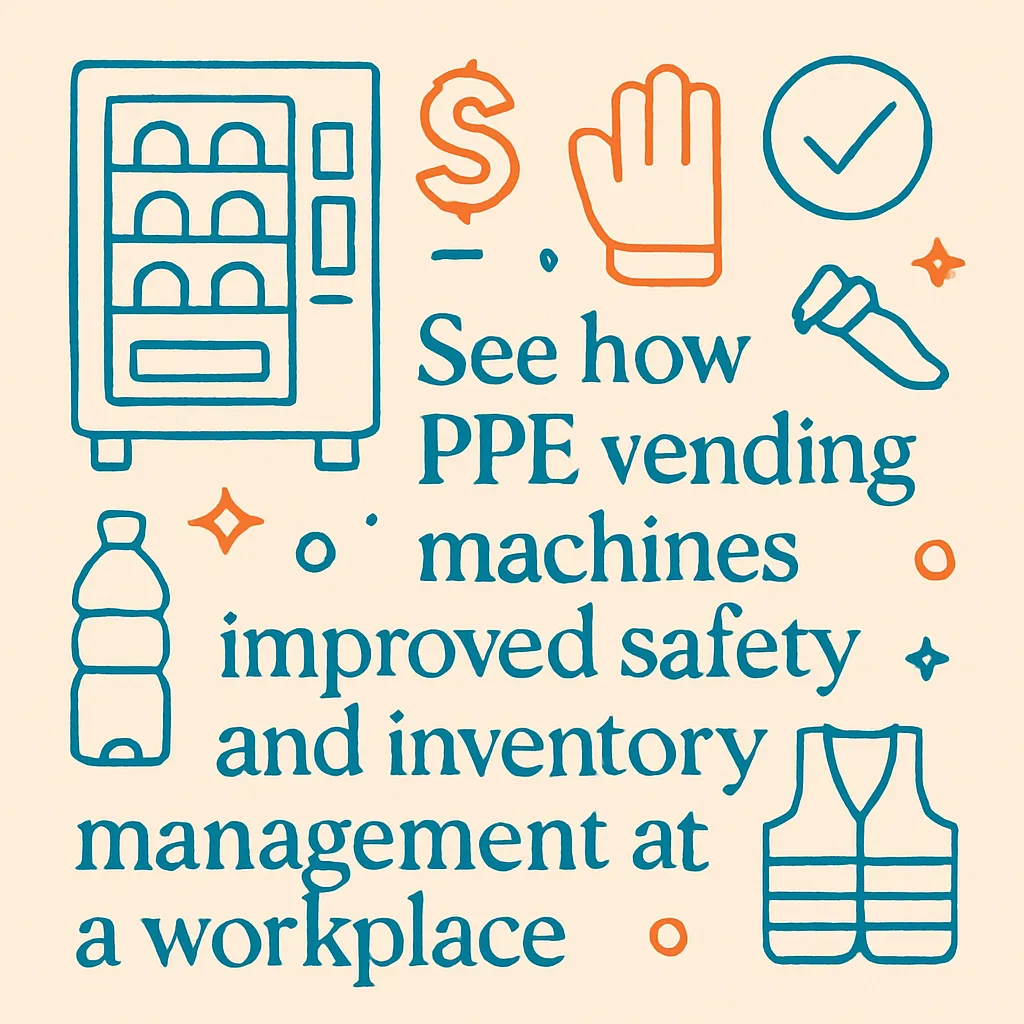Case Study: PPE Vending Machine Success
See how PPE vending machines improved safety and inventory management at a workplace.
Back to Specialty Vending Machines ResourcesSee how PPE vending machines improved safety and inventory management at a workplace.
Back to Specialty Vending Machines ResourcesDiscover how a PPE vending machine solution revolutionized safety compliance and optimized inventory tracking for a leading industrial facility, showcasing significant operational improvements.
![]() Ensured 24/7 access to critical Personal Protective Equipment
Ensured 24/7 access to critical Personal Protective Equipment
![]() Reduced PPE consumption and waste through controlled dispensing
Reduced PPE consumption and waste through controlled dispensing
![]() Streamlined inventory management with real-time tracking capabilities
Streamlined inventory management with real-time tracking capabilities

In demanding industrial environments, ensuring workers have immediate access to Personal Protective Equipment (PPE) is not just a matter of compliance, but a cornerstone of workplace safety and operational efficiency. This case study highlights the transformative effects of implementing PPE vending machines at a large manufacturing facility, demonstrating how a simple technological upgrade can yield significant improvements in safety, inventory management, and cost control.
Before the introduction of vending solutions, this facility faced common challenges: sporadic PPE availability, inconsistent usage tracking, and significant waste due to uncontrolled dispensing. Employees often had to walk long distances to retrieve essential items, leading to downtime and an increased risk of working without proper gear. The traditional method of manual distribution also made accurate inventory management burdensome and prone to errors, often resulting in either stockouts or overstocking of critical supplies.
The implementation of secure, automated PPE vending machines addressed these issues head-on. Strategically placed near workstations, these machines provided 24/7 access to safety gloves, masks, safety glasses, and hearing protection. Each employee gained access using their ID badge, creating a transparent, auditable trail of every dispensed item. This system immediately boosted compliance rates, as workers no longer had excuses for not having the required PPE. The convenience factor itself was a huge morale booster, reducing frustration and wasted time.
Beyond safety, the impact on inventory management in warehouse settings was profound. The vending machines' telemetry systems provided real-time data on consumption patterns, allowing the facility to move from reactive reordering to proactive, data-driven procurement. This reduced overall PPE expenditure by minimizing waste and preventing the costly cycle of emergency orders. Furthermore, the automated system freed up staff who were previously engaged in manual distribution, allowing them to focus on more value-added tasks. For businesses seeking similar efficiencies across their operations, understanding the benefits of a comprehensive vending management strategy is crucial.
A PPE vending machine is a specialized vending unit designed to dispense personal protective equipment such as gloves, masks, safety glasses, earplugs, and other essential safety gear in a controlled manner.
The case study showed improved safety by ensuring immediate access to necessary PPE, reducing instances of employees working without proper protection, and tracking usage to ensure compliance with safety protocols.
They provided real-time tracking of PPE distribution, eliminated stockouts, reduced waste by dispensing items one at a time, and offered valuable data on consumption patterns for optimized ordering.
They are highly beneficial for workplaces where PPE is critical, such as manufacturing, construction, healthcare, and laboratories, significantly enhancing safety and efficiency.
Typically, employees use an ID badge, PIN, or biometric scan to access items, which logs their usage and ensures accountability.
The machines can be configured to dispense a wide range of PPE, including gloves, masks, safety glasses, hard hats, ear protection, high-visibility vests, and even small tools.
Yes, by reducing overconsumption, theft, and waste, and by automating inventory management, the case study noted significant cost savings related to PPE supply.
Automated dispensing helps enforce compliance by ensuring that only authorized personnel can access specific PPE, and by maintaining a clear record of who took what, when.
The return on investment can be rapid due to reduced PPE consumption, improved safety, decreased administrative overhead, and enhanced regulatory compliance.
Real-time data allows management to identify usage trends, monitor stock levels, predict demand, and make informed decisions on procurement and safety policy adjustments.